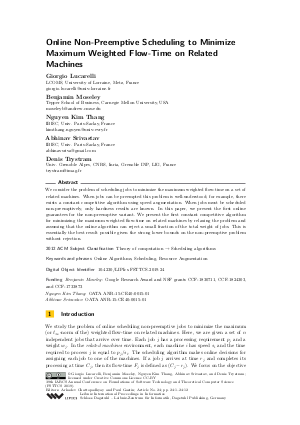Online Non-Preemptive Scheduling to Minimize Maximum Weighted Flow-Time on Related Machines
Authors Giorgio Lucarelli, Benjamin Moseley, Nguyen Kim Thang, Abhinav Srivastav, Denis Trystram
-
Part of:
Volume:
39th IARCS Annual Conference on Foundations of Software Technology and Theoretical Computer Science (FSTTCS 2019)
Part of: Series: Leibniz International Proceedings in Informatics (LIPIcs)
Part of: Conference: IARCS Annual Conference on Foundations of Software Technology and Theoretical Computer Science (FSTTCS) - License:
 Creative Commons Attribution 3.0 Unported license
Creative Commons Attribution 3.0 Unported license
- Publication Date: 2019-12-04
File

PDF
LIPIcs.FSTTCS.2019.24.pdf
- Filesize: 426 kB
- 12 pages
Document Identifiers
Subject Classification
ACM Subject Classification
- Theory of computation → Scheduling algorithms
Keywords
- Online Algorithms
- Scheduling
- Resource Augmentation
Metrics
- Access Statistics
-
Total Accesses (updated on a weekly basis)
0PDF Downloads0Metadata Views
Abstract
We consider the problem of scheduling jobs to minimize the maximum weighted flow-time on a set of related machines. When jobs can be preempted this problem is well-understood; for example, there exists a constant competitive algorithm using speed augmentation. When jobs must be scheduled non-preemptively, only hardness results are known. In this paper, we present the first online guarantees for the non-preemptive variant. We present the first constant competitive algorithm for minimizing the maximum weighted flow-time on related machines by relaxing the problem and assuming that the online algorithm can reject a small fraction of the total weight of jobs. This is essentially the best result possible given the strong lower bounds on the non-preemptive problem without rejection.
Cite As Get BibTex
Giorgio Lucarelli, Benjamin Moseley, Nguyen Kim Thang, Abhinav Srivastav, and Denis Trystram. Online Non-Preemptive Scheduling to Minimize Maximum Weighted Flow-Time on Related Machines. In 39th IARCS Annual Conference on Foundations of Software Technology and Theoretical Computer Science (FSTTCS 2019). Leibniz International Proceedings in Informatics (LIPIcs), Volume 150, pp. 24:1-24:12, Schloss Dagstuhl – Leibniz-Zentrum für Informatik (2019)
https://doi.org/10.4230/LIPIcs.FSTTCS.2019.24
BibTex
@InProceedings{lucarelli_et_al:LIPIcs.FSTTCS.2019.24,
author = {Lucarelli, Giorgio and Moseley, Benjamin and Thang, Nguyen Kim and Srivastav, Abhinav and Trystram, Denis},
title = {{Online Non-Preemptive Scheduling to Minimize Maximum Weighted Flow-Time on Related Machines}},
booktitle = {39th IARCS Annual Conference on Foundations of Software Technology and Theoretical Computer Science (FSTTCS 2019)},
pages = {24:1--24:12},
series = {Leibniz International Proceedings in Informatics (LIPIcs)},
ISBN = {978-3-95977-131-3},
ISSN = {1868-8969},
year = {2019},
volume = {150},
editor = {Chattopadhyay, Arkadev and Gastin, Paul},
publisher = {Schloss Dagstuhl -- Leibniz-Zentrum f{\"u}r Informatik},
address = {Dagstuhl, Germany},
URL = {https://drops.dagstuhl.de/entities/document/10.4230/LIPIcs.FSTTCS.2019.24},
URN = {urn:nbn:de:0030-drops-115867},
doi = {10.4230/LIPIcs.FSTTCS.2019.24},
annote = {Keywords: Online Algorithms, Scheduling, Resource Augmentation}
}
Author Details
Funding
- Moseley, Benjamin: Google Research Award and NSF grants CCF-1830711, CCF-1824303, and CCF-1733873
- Thang, Nguyen Kim: OATA ANR-15-CE40-0015-01
- Srivastav, Abhinav: OATA ANR-15-CE40-0015-01
References
-
C. Ambühl and M. Mastrolilli. On-line scheduling to minimize max flow time: an optimal preemptive algorithm. Oper. Res. Lett., 33(6):597-602, 2005.

-
S. Anand, K. Bringmann, T. Friedrich, N. Garg, and A. Kumar. Minimizing Maximum (Weighted) Flow-time on Related and Unrelated Machines. In Proceedings of International Colloquium on Automata, Languages and Programming, pages 13-24, 2013.

-
S. Anand, N. Garg, and A. Kumar. Resource augmentation for weighted flow-time explained by dual fitting. In Proceedings of Symposium on Discrete Algorithms, pages 1228-1241, 2012.

-
N. Bansal and E. Cloostermans. Minimizing Maximum Flow-Time on Related Machines. In Proceedings of Workshop on Approximation Algorithms for Combinatorial Problems, pages 1-14, 2015.

-
N. Bansal and K. Pruhs. Server Scheduling in the Weighted 𝓁p Norm. In Proceedings of Latin American Symposium on Theoretical Informatics, pages 434-443, 2004.

-
Chandra Chekuri, Sungjin Im, and Benjamin Moseley. Online Scheduling to Minimize Maximum Response Time and Maximum Delay Factor. Theory of Computing, 8(1):165-195, 2012.

-
A.R. Choudhury, S. Das, N. Garg, and A .Kumar. Rejecting jobs to Minimize Load and Maximum Flow-time. In Proceedings of Symposium on Discrete Algorithms, pages 1114-1133, 2015.

-
A.R. Choudhury, S. Das, A. Kumar, P. Harsha, and G. Ramalingam. Minimizing weighted 𝓁_p-norm of flow-time in the rejection model. In Proceedings on the Conference on Foundations of Software Technology and Theoretical Computer Science, volume 45, pages 25-37, 2015.

-
P.F. Dutot, E. Saule, A. Srivastav, and Denis D. Trystram. Online Non-preemptive Scheduling to Optimize Max Stretch on a Single Machine. In Proceedings of nternational Conference on Computing and Combinatorics, pages 483-495, 2016.

-
K. Fox, S. Im, and B. Moseley. Energy efficient scheduling of parallelizable jobs. In Proceedings of Symposium on Discrete Algorithms, pages 948-957, 2013.

-
A. Gupta, S. Im, R. Krishnaswamy, B. Moseley, and K. Pruhs. Scheduling heterogeneous processors isn't as easy as you think. In Proceedings of Symposium on Discrete Algorithms, pages 1242-1253, 2012.

-
B. Kalyanasundaram and K. Pruhs. Speed is as powerful as clairvoyance. Journal of ACM, 47(4):617-643, 2000.

-
Giorgio Lucarelli, Nguyen Kim Thang, Abhinav Srivastav, and Denis Trystram. Online Non-preemptive Scheduling in a Resource Augmentation Model based on Duality. In European Symposium on Algorithms (ESA, 2016), volume 57, pages 1-17, 2016.

-
B.A. Michael, S. Chakrabarti, and S. Muthukrishnan. Flow and Stretch Metrics for Scheduling Continuous Job Streams. In Proceedings of the Annual Symposium on Discrete Algorithms, pages 270-279, 1998.

-
C.A. Phillips, C. Stein, and E. Torng andJ. Wein. Optimal time-critical scheduling via resource augmentation. Algorithmica, 32(2):163-200, 2002.

-
Im S, B. Moseley, K. Pruhs, and C. Stein. Minimizing Maximum Flow Time on Related Machines via Dynamic Posted Pricing. In 25th Annual European Symposium on Algorithms, ESA 2017, September 4-6, 2017, Vienna, Austria, pages 51:1-51:10, 2017.

-
N.K. Thang. Lagrangian Duality in Online Scheduling with Resource Augmentation and Speed Scaling. In Proceedings of European Symposium on Algorithms, pages 755-766, 2013.

